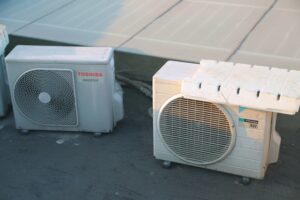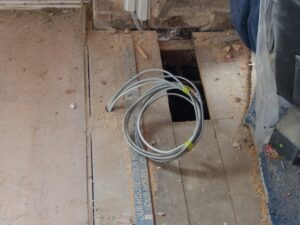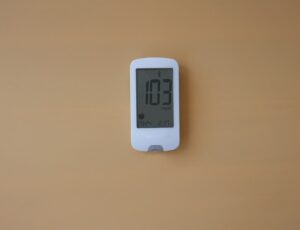Have you ever found yourself waiting much longer than usual for hot water to flow from your taps?
You’re not alone!
A slow-heating water heater can be frustrating, especially when you need a quick shower or a warm bath. But what causes this delay, and how can you fix it?
The reasons behind a sluggish water heater vary from something as simple as a thermostat setting to more complex issues like sediment buildup or a faulty heating element. Fortunately, many of these problems are easy to diagnose and resolve.
But how do you know where to start?
Let’s explore the potential causes and effective solutions to help you get your water heater back to its optimal performance. Whether it’s a quick adjustment or a more comprehensive repair, we’ve got you covered.
And if it turns out you need expert assistance, Excel Mechanical is just a call away! We offer top-tier HVAC and plumbing services, always prioritizing your comfort and peace of mind.
In this blog, you will learn:
- The common reasons your hot water heater takes too long to heat up.
- The steps you can take to fix the issue yourself.
- When it’s time to call in the experts.
Here is the full breakdown!
Understanding Water Heaters
Water heaters are essential for providing hot water in homes and businesses. Grasping their types, functioning, and factors that affect heating times can help you select the best system for your needs.
Types of Water Heaters
There are several types of water heaters, each with unique features.
- Tank water heaters store and heat large volumes of water, making them suitable for households with high water usage.
- Tankless water heaters, on the other hand, heat water on demand. This can be more energy-efficient but might limit the flow rate.
- Heat pump water heaters are another option. They use electricity to transfer heat instead of generating it directly, making them more energy-efficient.
- Solar water heaters use energy from the sun, which can be cost-effective in areas with ample sunlight.
Each type meets different needs, providing various efficiency, cost, and usage benefits.
How Water Heaters Function
Understanding how water heaters work is essential.
- Traditional tank heaters use a heating element or burner beneath the tank to warm water, which is then stored for use.
- In contrast, tankless models have coils that heat the water as it passes through, delivering hot water almost instantly when needed.
- Heat pump heaters extract heat from the surrounding air and transfer it to the water, which can be more efficient in warmer climates.
- Solar heaters capture solar energy to warm the water, reducing reliance on conventional energy sources.
While each type may operate differently, they aim to provide a consistent hot water supply.
Factors Influencing Heating Time
The time it takes for a water heater to heat up can vary based on several factors.
- The heater’s capacity is crucial; larger tanks naturally take longer to heat entirely.
- The water heater’s type also plays a role. For example, traditional tank heaters with larger capacities need more time than tankless ones.
- The input temperature affects heating time; colder water takes longer to warm.
- Additionally, maintenance impacts efficiency; a well-maintained unit with regular service by professionals will perform optimally.
We are known for exceptional HVAC and plumbing service quality, ensuring tailored solutions to individual needs and budgets. Our dedication to quality and value sets us apart in both residential and commercial settings.
Common Causes of Delayed Heating
Several factors could be at play when your water heater takes longer than usual to heat up. These can range from internal build-up to faulty components. Addressing these issues promptly can improve the efficiency and performance of your water heater.
Sediment Build-Up
Over time, minerals and debris can gather at the bottom of the water heater tank. This sediment acts as a barrier between the heating element and the water, making it take longer for the unit to heat up.
You might notice noises like popping or rumbling as the heating element struggles against the sediment. Flushing the tank regularly can prevent this buildup and ensure efficient operation.
If left unchecked, sediment can also lead to corrosion or even tank failure. Regular maintenance can help you avoid these costly repairs.
Faulty Heating Elements
Your water heater typically has one or two heating elements that warm the water.
When these elements become faulty or burn out, they can’t efficiently heat the water, leading to longer wait times for hot water. Diagnosing this issue involves using a multimeter to check for electrical continuity.
Replacing a faulty element can restore the system’s ability to heat water quickly. If you are uncomfortable doing this alone, contacting a professional like us ensures the problem is fixed correctly and safely, returning your heater to full efficiency.
Malfunctioning Thermostat
If your thermostat is not working correctly, it may misread the actual water temperature, preventing it from reaching your desired heat level.
When the thermostat is set too low or malfunctions, the water heater might take longer to heat it because it does not receive the correct signals to activate the heating elements.
Adjusting the thermostat setting might be a quick fix, but if the problem persists, replacing the thermostat may be necessary. If these adjustments don’t improve the issue, consulting with professionals is essential.
Proper thermostat function is crucial for maintaining consistent water temperature and efficient heating.
Inadequate Tank Size
A tank that is too small for household needs can lead to long waits for hot water, particularly during high-demand periods.
If the tank cannot keep up with usage, it runs out of hot water too quickly, and you’ll be left waiting for it to heat again. This situation is common in households or businesses with growing demands.
If you frequently run out of hot water, you may need to consider upgrading to a larger tank.
Troubleshooting Steps
When your water heater takes too long to heat up, it might be due to several issues. You can explore these potential problems by inspecting and testing key components of your system.
Inspecting the Heater
- Start by checking if the heater is getting power and if the thermostat is set correctly.
- Look for signs of wear or damage on wires and connections. If it’s a gas unit, examine the pilot light to make sure it’s lit and steady.
- Next, check for sediment buildup at the bottom of the tank. This can act as an insulator, slowing heating time.
- You might need to flush the tank to remove this buildup. If the tank is leaking or rusted, it might need to be replaced.
Testing Components
Test the thermostat by setting it to different temperatures and checking if the water heats as expected.
A malfunctioning thermostat can be a major cause of slow heating. If you feel comfortable doing so, you can test continuity using a multimeter. Inspect heating elements for signs of wear.
To check, turn off the power and remove the elements to test their resistance. Elements with little resistance might need replacing. If you have doubts, consider seeking professional help.
Maintenance Tips
Proper upkeep of your water heater can improve its efficiency and extend its lifespan. Regular maintenance involves steps like flushing the tank, replacing the anode rod, and adjusting the thermostat for best performance.
Regular Flushing
Flushing your water heater regularly helps remove mineral deposits and sediment accumulate over time. These deposits can lower heating efficiency and cause your heater to take longer to warm up.
To flush your tank, first turn off the power and water supply. Attach a hose to the drain valve and direct the other end to a suitable drainage location. Open the valve and let the water drain completely. This process clears out sediment buildup, allowing the heater to work more efficiently.
Doing this annually or semi-annually can ensure the system operates smoothly.
Anode Rod Replacement
The anode rod is a crucial component that prevents tank corrosion.
Over time, it will degrade, and replacing it is essential to maintain your water heater’s functionality. To check the rod, turn off the power and water, and release some tank pressure by opening a hot water tap.
Then, remove the anode rod using a socket wrench and inspect it. If more than six inches of the rod is corroded, it’s time to replace it. This simple task can extend the lifespan of your heater and keep it working efficiently.
Replacing the rod every few years can save you from costly repairs.
Thermostat Adjustment
Adjusting the thermostat can optimize energy use and improve heating times.
Check the current setting, which is generally factory set to about 120°F. Increasing the thermostat setting slightly if the water isn’t hot enough or takes too long to warm up. Be cautious not to go too high, as temperatures above 140°F can cause scalding.
Testing your water temperature post-adjustment ensures it meets your needs without wasting energy. Regular checks and adjustments keep your heater operating at peak performance, saving on utility costs and improving your comfort.
Professional Intervention
If your hot water heater takes longer than usual to heat up, it may be time to consider seeking professional help. Timely action can prevent further issues and ensure your system is functioning efficiently.
When to Call a Technician
If your water heater continually underperforms, contact a technician. This can include situations where the water takes excessively long to heat or doesn’t reach the desired temperature.
Unusual noises, leaks, or rust-colored water are also signals that warrant professional attention. Persistent problems can be signs of deeper mechanical issues, possibly requiring part replacements.
Turn to experts to avoid more extensive damage and higher costs. Our team excels at diagnosing and repairing these issues swiftly, ensuring your water heater operates effectively.
Choosing a Service Provider
Selecting the right service provider is crucial for resolving your water heater problems.
Look for a company with a proven history of excellent service, like Excel Mechanical. Consider their expertise in both residential and commercial systems. It is important to choose professionals who offer tailored solutions that fit your needs and budget. Check their certifications, customer reviews, and service warranties.
A reputable provider solves current issues and offers advice on maintaining your system to prevent future problems. This ensures you receive the highest value and quality service.
Energy Efficiency and Upgrades
Maximizing energy efficiency in your water heating system can save you money and reduce wasted energy. Upgrades like improved insulation and switching to a tankless water heater are key changes that enhance system efficiency.
Reducing Heat Loss
Heat loss is a common issue in traditional water heaters.
Insulating the tank and surrounding pipes can minimize this loss. You can use insulation blankets or sleeves specifically designed for this purpose.
Check the R-value of your insulation material—the higher the R-value, the better it will reduce heat loss. An R-value between 24 and 30 is typically recommended for efficient insulation. By taking these steps, the tank maintains temperature longer, cutting down on energy used to reheat water.
Consider setting the thermostat to a moderate level, around 120°F, to further improve energy efficiency without compromising comfort.
Considering Tankless Options
Switching to a tankless water heater can be a significant energy-saving upgrade.
Unlike traditional heaters, tankless models heat water on demand, eliminating standby energy losses that occur when hot water is stored.
With tankless water heaters, you only heat the water you need, which can lead to lower energy bills. Such systems tend to have a longer lifespan and can be a worthwhile investment for both homes and businesses. They provide a continuous hot water supply and are often more compact, saving space.
Installation and Replacement
Choosing the right water heater and ensuring proper installation are crucial for efficiency and longevity. When replacing or installing a water heater, several factors, such as size, type, and professional help, must be considered.
Selecting a New Water Heater
Choosing a new water heater requires careful thought about your home’s needs and budget.
First, decide between a tank and a tankless system. Tankless water heaters offer energy savings and a smaller footprint but might have a higher upfront cost. Then, consider the capacity needed to ensure it meets your household’s demands.
Look for energy-efficient models to reduce long-term utility costs. Check for features like digital displays and smart controls that boost user convenience. Also, the warranty and expected lifespan should be evaluated, as this impacts future maintenance and replacement plans.
Professional Installation Considerations
Proper installation is key to the performance and safety of your water heater.
Hiring professionals like Excel Mechanical ensures the work is done efficiently and according to local codes. They handle complex tasks like gas connections and ventilation, minimizing risk.
Ensure that the installation site is prepared, has adequate space, and has proper electrical access. Professionals will also adjust the temperature settings and advise on optimal heater settings for your needs.
At Excel Mechanical, you benefit from installation and ongoing support expertise tailored to residential or commercial needs.
Regulatory and Safety Considerations
When dealing with hot water heaters, maintaining safety and adhering to regulations matter. Gas and electric water heaters need to comply with local building codes. These codes ensure proper installation and help reduce risks.
Key Safety Measures:
- Installation: Ensure a certified professional installs your heater. This reduces risks like gas leaks or electrical hazards.
- Ventilation: Proper ventilation is crucial for gas heaters to prevent dangerous gas buildup.
- Carbon Monoxide Detectors: Install detectors near gas water heaters for added safety.
Regular maintenance is vital. This includes checking for leaks, inspecting gas lines, and ensuring valves work properly. Addressing issues promptly can prevent further damage.
Cost Analysis and Budgeting
Heating water efficiently is crucial for cost savings.
Fuel type plays a big role—electric heaters often cost more to run than gas models. Ensuring the heater is the right size for your needs can prevent excessive costs. Oversized units increase initial costs and lead to higher ongoing expenses.
Factors Influencing Costs:
- Type of Heater: Electric vs. Gas
- Size of the Unit: Tankless or Tank
- Energy Efficiency: Higher efficiency often means lower utility bills
Maintenance is another crucial aspect. Regular check-ups can prevent costly repairs. Cleaning the tank and checking the thermostat can also help maintain efficiency.
When planning your budget, consider installation fees as well. Our team offers competitive rates without compromising quality. Excel Mechanical is your trusted partner for achieving long-term savings and efficiency in both residential and commercial settings.
Frequently Asked Questions
Understanding the reasons behind slow hot water delivery can help improve its efficiency. These FAQs address common issues and potential solutions.
Why is my electric water heater slow to heat up?
Several factors can cause slow heating in electric water heaters, including a faulty heating element, a broken thermostat, or sediment buildup in the tank. Regular maintenance and checking of these components can help speed up the heating process.
What causes delayed hot water flow to faucets and showers?
Delayed hot water flow often results from the distance between the heater and the fixture. Long pipe runs and heat loss through uninsulated pipes can contribute to this issue. You might also experience delays due to pipe size or water demand.
How can I speed up the hot water arrival to my tap?
Insulating pipes and using a hot water recirculating pump can significantly speed up hot water delivery. Minimizing the distance between your water heater and taps can also help.
Why does hot water take longer to reach the shower than other fixtures?
Showers are often farther from the water heater than other fixtures, leading to longer wait times. The size of the pipes and demand on other fixtures can also affect how quickly hot water arrives.
Can a hot water recirculating pump improve my system’s heating time?
Yes, a recirculating pump can continuously circulate hot water through your pipes, reducing the wait time for hot water. This system is beneficial in large homes with fixtures far from the heater.
What troubleshooting steps should I take if my water heater’s recovery time has increased?
Check for sediment buildup in the tank and inspect the heater’s elements and thermostat. Regularly flushing the tank can prevent sediment-related issues. If issues persist, Excel Mechanical can offer professional advice and service to ensure your system’s best performance.




